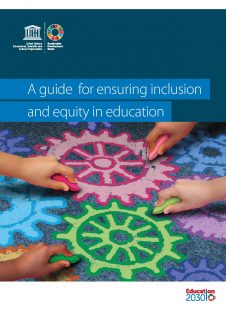 13-07-2017, UNESCO | UNESCO’s figures reveal that 263 million children, youth and adolescents, aged between 6 and 17 years, are not in school today and progression through the school system continues to be a significant challenge in many countries. Additionally, availability of educational facilities and provisions does not equate with ensuring the inclusion of all children in the learning process. In fact, many children and young people attending school continue to be excluded from effective learning opportunities and are unable to appreciate equally the expected benefits of quality education. Recent studies have shown that once in school, children and young people from vulnerable groups are more likely to be targeted by school violence and bullying from teachers and peers, with negative consequences on educational quality and outcomes.
13-07-2017, UNESCO | UNESCO’s figures reveal that 263 million children, youth and adolescents, aged between 6 and 17 years, are not in school today and progression through the school system continues to be a significant challenge in many countries. Additionally, availability of educational facilities and provisions does not equate with ensuring the inclusion of all children in the learning process. In fact, many children and young people attending school continue to be excluded from effective learning opportunities and are unable to appreciate equally the expected benefits of quality education. Recent studies have shown that once in school, children and young people from vulnerable groups are more likely to be targeted by school violence and bullying from teachers and peers, with negative consequences on educational quality and outcomes.
The situation will not improve unless countries develop and implement inclusive education policies and programmes and ensure inclusive learning environments, curricula and pedagogy for all learners. The core message of this Guide is: every learner matters and matters equally. This is what inclusion is about. We should respect diverse needs, abilities and characteristics of learners and eliminate all forms of discrimination in all learning places. As Mel Ainscow, Emeritus Professor at the University of Manchester and coordinator of the drafting of the publication highlights: ‘the promotion of inclusion and equity in schools is about learning how to live with difference and, indeed, learning how to learn from difference’. ‘It is about finding out multiple ways to engage students in their learning process, in order for them to lead and take responsibility of it’ adds Renato Opertti, Senior programme specialist, IBE-UNESCO. This cannot be achieved from one day to another. In order to bring system-wide change, inclusion and equity should be mainly considered as processes that require multi-level programme and comprehensive policy interventions, as well as the engagement of different stakeholders from both within and outside the education system.
This guide on ensuring inclusion and equity in education is published as the world recently committed to a renewed framework for sustainable development. Sustainable Development Goal (SDG) 4 on Education calls for inclusive and equitable quality education and lifelong learning opportunities for all by 2030. “It is our ethical mandate and common responsibility to ensure that those groups that are at risk and marginalized from learning opportunities have the right to quality education,” says Florence Migeon, Programme specialist for Inclusion in education at UNESCO. Marginalized groups should be carefully monitored and, where necessary, we should take steps to ensure their presence, participation and achievement within the education system. In this way, it is made clear that the new SDG on Education is about educating and learning for all.
What does this guide offer?
With this Guide, UNESCO seeks to offer practical support to Member States to review how well equity and inclusion currently figure in existing policies, decide what actions need to be taken to improve policies, and monitor progress as actions are taken. An assessment framework is proposed to accompany countries in this review exercise, by taking into account four key dimensions: concepts, policy statements, structures and systems, and practices.
Additionally, the evidence from international research included in this Guide will allow Member States to learn from the progress made by other countries towards more inclusive and equitable education systems. How is Ghana assessing the inclusiveness of mainstream schools? How is Denmark developing a unifying sense of community by listening to children for better inclusion and equity? How do students help teachers to innovate in Portugal? These are only a few examples of effective practices that advance the right of every learner to inclusive and equitable education.
The guide for ensuring inclusion and equity in education was published by UNESCO’s Section of Education for Inclusion and Gender Equality and the International Bureau of Education.
Bron: UNESCO
